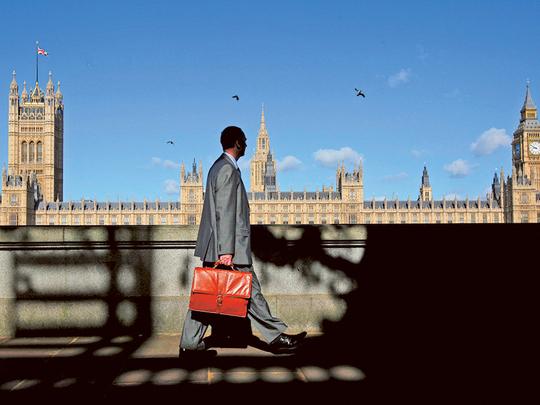
Leicester: With six days to go before Britons vote in a general election and with neither Conservatives nor Labour on course for an overall majority of 326 of the 650 seats in Westminster, the potential coalition partners are now a key issue in the campaign.
On Thursday night on the BBC’s Question Time, both Conservative Leader David Cameron and Labour’s Ed Miliband faced tough questions from an audience of voters over deals to form a government. And it was Miliband who ruled out any deal with Scottish Nationalists — either as coalition partners or an ad hoc supply and support basis.
“Let me be plain. We’re not going to do a deal with the Scottish National party; we’re not going to have a coalition, we’re not going to have a deal,” he said.
“If it meant we weren’t going to be in government, not doing a coalition, not having a deal, then so be it.
“I am not going to sacrifice the future of our country, the unity of our country, I’m not going to give in to SNP demands around Trident, around the deficit, or anything like that... I am not going to have a Labour government if it means deals or coalitions with the SNP.”
Reacting to Miliband’s tough line on working with the SNP, Sturgeon said on the BBC Scotland Question Time segment: “I heard Ed Miliband and he sounded awfully like he was saying — and I hope I’m wrong about this because I think people across Scotland and the rest of the UK would be appalled if I’m right — he sounded as if he was saying that he would rather see David Cameron and the Conservatives back in government than actually work with the SNP. “Now, if he means that, then I don’t think people in Scotland will ever forgive Labour for allowing the Conservatives back into office. But if he is a minority government, then he will not be able to get policies through without winning support from other parties.”
Miliband’s comments marked a hardening of his position, which has progressively toughened in recent months.
Cameron, who has had to rely on the Liberal Democrats as coalition partners for the past five years, used his segment to appeal directly to voters to give Conservatives an overall majority.
“We came so close last time,” he said, adding that his party were just 23 seats short of an overall majority last time. He said he was urging voters now to ensure that the UK had a strong and stable government.
But while the latest opinion polls show the Conservatives having a 37 per cent to 35 per cent lead over Labour, they still were short of being able to form a majority government on May 8.
Cameron said that his “red line” condition was holding a referendum on the UK’s continued membership in the European Union by 2017 — a position that was likely to appeal to right-wing voters attracted to the anti-EU policies of the United Kingdom Independence Party (Ukip). If those opinion polls are accurate, Ukip could potentially hold 15 seats in the new fractured parliament — enough to give it seats at the Cabinet table in another Conservative-led coalition government with Cameron remaining as prime minister.












